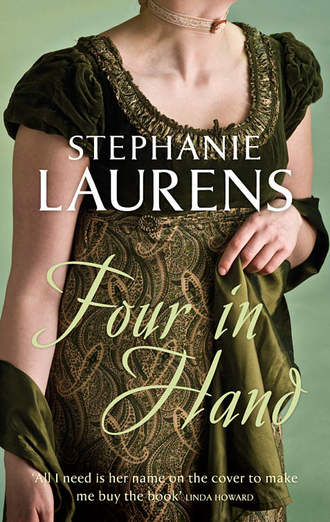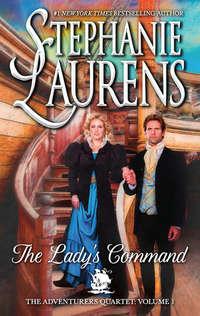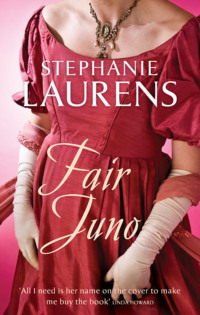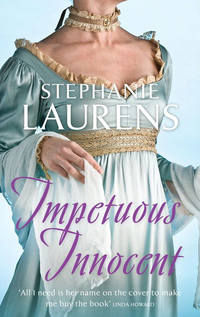
Полная версия
Four in Hand
He tugged the bell pull and Hillshaw appeared. “Have the carriage brought around. Miss Twinning is returning to Grillon’s.”
“Yes, Your Grace.”
“Oh, no! I couldn’t put you to so much trouble,” said Caroline.
“My dear child,” drawled Max, “my wards would certainly not go about London in hacks. See to it, Hillshaw.”
“Yes, Your Grace.” Hillshaw withdrew, for once in perfect agreement with his master.
Caroline found the blue eyes, which had quizzed her throughout this exchange, still regarding her, a gently mocking light in their depths. But she was a lady of no little courage and smiled back serenely, unknowingly sealing her fate.
Never, thought Max, had he met a woman so attractive. One way or another, he would break the ties of guardianship. A short silence fell, punctuated by the steady ticking of the long case clock in the corner. Max took the opportunity afforded by Miss Twinning’s apparent fascination with the rows of leather-bound tomes at his back to study her face once more. A fresh face, full of lively humour and a brand of calm self-possession which, in his experience, was rarely found in young women. Undoubtedly a woman of character.
His sharp ears caught the sound of carriage wheels in the street. He rose and Caroline perforce rose, too. “Come, Miss Twinning. Your carriage awaits.”
Max led her to the front door but forbore to go any further, bowing over her hand gracefully before allowing Hillshaw to escort her to the waiting carriage. The less chance there was for anyone to see him with her the better. At least until he had solved this guardianship tangle.
AS SOON AS the carriage door was shut by the majestic Hillshaw, the horses moved forward at a trot. Caroline lay back against the squabs, her gaze fixed unseeingly on the near-side window as the carriage traversed fashionable London. Bemused, she tried to gauge the effect of the unexpected turn their futures had taken. Imagine having a guardian like that!
Although surprised at being redirected from Twyford House to Delmere House, she had still expected to meet the vague and amenable gentleman who had so readily acquiesced, albeit by correspondence, to all her previous suggestions. Her mental picture of His Grace of Twyford had been of a man in late middle age, bewigged as many of her father’s generation were, distinctly past his prime and with no real interest in dealing with four lively young women. She spared a small smile as she jettisoned her preconceived image. Instead of a comfortable, fatherly figure, she would now have to deal with a man who, if first impressions were anything to go by, was intelligent, quick-witted and far too perceptive for her liking. To imagine the new Duke would not know to a nicety how to manage four young women was patently absurd. If she had been forced to express an opinion, Caroline would have said that, with the present Duke of Twyford, managing women was a speciality. Furthermore, given his undoubted experience, she strongly suspected he would be highly resistant to feminine cajoling in any form. A frown clouded her grey-green eyes. She was not entirely sure she approved of the twist their fates had taken. Thinking back over the recent interview, she smiled. He had not seemed too pleased with the idea himself.
For a moment, she considered the possibility of coming to some agreement with the Duke, essentially breaking the guardianship clause of her father’s will. But only for a moment. It was true she had never been presented to the ton but she had cut her social eyeteeth long ago. While the idea of unlimited freedom to do as they pleased might sound tempting, there was the undeniable fact that she and her half-sisters were heiresses of sorts. Her father, having an extremely repressive notion of the degree of knowledge which could be allowed mere females, had never been particularly forthcoming regarding their eventual state. Yet there had never been any shortage of funds in all the years Caroline could remember. She rather thought they would at least be comfortably dowered. Such being the case, the traps and pitfalls of society, without the protection of a guardian, such as the Duke of Twyford, were not experiences to which she would willingly expose her sisters.
As the memory of a certain glint in His Grace of Twyford’s eye and the distinctly determined set of his jaw drifted past her mind’s eye, the unwelcome possibility that he might repudiate them, for whatever reasons, hove into view. Undoubtedly, if there was any way to overset their guardianship, His Grace would find it. Unaccountably, she was filled with an inexplicable sense of disappointment.
Still, she told herself, straightening in a purposeful way, it was unlikely there was anything he could do about it. And she rather thought they would be perfectly safe with the new Duke of Twyford, as long as they were his wards. She allowed her mind to dwell on the question of whether she really wanted to be safe from the Duke of Twyford for several minutes before giving herself a mental shake. Great heavens! She had only just met the man and here she was, mooning over him like a green girl! She tried to frown but the action dissolved into a sheepish grin at her own susceptibility. Settling more comfortably in the corner of the luxurious carriage, she fell to rehearsing her description of what had occurred in anticipation of her sisters’ eager questions.
WITHIN MINUTES of Caroline Twinning’s departure from Delmere House, Max had issued a succession of orders, one of which caused Mr. Hubert Whitney, son of Mr. Josiah Whitney, the patriarch of the firm Whitney and White, Solicitors, of Chancery Lane, to present himself at Delmere House just before eleven. Mr. Whitney was a dry, desiccated man of uncertain age, very correctly attired in dusty black. He was his father’s son in every way and, now that his sire was no longer able to leave his bed, he attended to all his father’s wealthier clients. As Hillshaw showed him into the well-appointed library, he breathed a sigh of relief, not for the first time, that it was Max Rotherbridge who had inherited the difficult Twyford estates. Unknown to Max, Mr. Whitney held him in particular esteem, frequently wishing that others among his clients could be equally straightforward and decisive. It really made life so much easier.
Coming face-to-face with his favourite client, Mr. Whitney was immediately informed that His Grace, the Duke of Twyford, was in no way amused to find he was apparently the guardian of four marriageable young ladies. Mr. Whitney was momentarily at a loss. Luckily, he had brought with him all the current Twyford papers and the Twinning documents were among these. Finding that his employer did not intend to upbraid him for not having informed him of a circumstance which, he was only too well aware, he should have brought forward long ago, he applied himself to assessing the terms of the late Sir Thomas Twinning’s will. Having refreshed his memory on its details, he then turned to the late Duke’s will.
Max stood by the fire, idly watching. He liked Whitney. He did not fluster and he knew his business.
Finally, Mr. Whitney pulled the gold pince-nez from his face and glanced at his client. “Sir Thomas Twinning predeceased your uncle, and, under the terms of your uncle’s will, it’s quite clear you inherit all his responsibilities.”
Max’s black brows had lowered. “So I’m stuck with this guardianship?”
Mr. Whitney pursed his lips. “I wouldn’t go so far as to say that. The guardianship could be broken, I fancy, as it’s quite clear Sir Thomas did not intend you, personally, to be his daughters’ guardian.” He gazed at the fire and solemnly shook his head. “No one, I’m sure, could doubt that.”
Max smiled wryly.
“However,” Mr. Whitney continued, “should you succeed in dissolving the guardianship clause, then the young ladies will be left with no protector. Did I understand you correctly in thinking they are presently in London and plan to remain for the Season?”
It did not need a great deal of intelligence to see where Mr. Whitney’s discourse was heading. Exasperated at having his usually comfortably latent conscience pricked into life, Max stalked to the window and stood looking out at the courtyard beyond, hands clasped behind his straight back. “Good God, man! You can hardly think I’m a suitable guardian for four sweet young things!”
Mr. Whitney, thinking the Duke could manage very well if he chose to do so, persevered. “There remains the question of who, in your stead, would act for them.”
The certain knowledge of what would occur if he abandoned four inexperienced, gently reared girls to the London scene, to the mercies of well-bred wolves who roamed its streets, crystallised in Max’s unwilling mind. This was closely followed by the uncomfortable thought that he was considered the leader of one such pack, generally held to be the most dangerous. He could hardly refuse to be Caroline Twinning’s guardian, only to set her up as his mistress. No. There was a limit to what even he could face down. Resolutely thrusting aside the memory, still vivid, of a pair of grey-green eyes, he turned to Mr. Whitney and growled, “All right, dammit! What do I need to know?”
Mr. Whitney smiled benignly and started to fill him in on the Twinning family history, much as Caroline had told it. Max interrupted him. “Yes, I know all that! Just tell me in round figures—how much is each of them worth?”
Mr. Whitney named a figure and Max’s brows rose. For a moment, the Duke was entirely bereft of speech. He moved towards his desk and seated himself again.
“Each?”
Mr. Whitney merely inclined his head in assent. When the Duke remained lost in thought, he continued, “Sir Thomas was a very shrewd businessman, Your Grace.”
“So it would appear. So each of these girls is an heiress in her own right?”
This time, Mr. Whitney nodded decisively.
Max was frowning.
“Of course,” Mr. Whitney went on, consulting the documents on his knee, “you would only be responsible for the three younger girls.”
Instantly he had his client’s attention, the blue eyes oddly piercing. “Oh? Why is that?”
“Under the terms of their father’s will, the Misses Twinning were given into the care of the Duke of Twyford until they attained the age of twenty-five or married. According to my records, I believe Miss Twinning to be nearing her twenty-sixth birthday. So she could, should she wish, assume responsibility for herself.”
Max’s relief was palpable. But hard on its heels came another consideration. Caroline Twinning had recognised his interest in her—hardly surprising as he had taken no pains to hide it. If she knew he was not her guardian, she would keep him at arm’s length. Well, try to, at least. But Caroline Twinning was not a green girl. The aura of quiet self-assurance which clung to her suggested she would not be an easy conquest. Obviously, it would be preferable if she continued to believe she was protected from him by his guardianship. That way, he would have no difficulty in approaching her, his reputation notwithstanding. In fact, the more he thought of it, the more merits he could see in the situation. Perhaps, in this case, he could have his cake and eat it too? He eyed Mr. Whitney. “Miss Twinning knows nothing of the terms of her father’s will. At present, she believes herself to be my ward, along with her half-sisters. Is there any pressing need to inform her of her change in status?”
Mr. Whitney blinked owlishly, a considering look suffusing his face as he attempted to unravel the Duke’s motives for wanting Miss Twinning to remain as his ward. Particularly after wanting to dissolve the guardianship altogether. Max Rotherbridge did not normally vacillate.
Max, perfectly sensible of Mr. Whitney’s thoughts, put forward the most acceptable excuses he could think of. “For a start, whether she’s twenty-four or twenty-six, she’s just as much in need of protection as her sisters. Then, too, there’s the question of propriety. If it was generally known she was not my ward, it would be exceedingly difficult for her to be seen in my company. And as I’ll still be guardian to her sisters, and as they’ll be residing in one of my establishments, the situation could become a trifle delicate, don’t you think?”
It was not necessary for him to elaborate. Mr. Whitney saw the difficulty clearly enough. It was his turn to frown. “What you say is quite true.” Hubert Whitney had no opinion whatever in the ability of the young ladies to manage their affairs. “At present, there is nothing I can think of that requires Miss Twinning’s agreement. I expect it can do no harm to leave her in ignorance of her status until she weds.”
The mention of marriage brought a sudden check to Max’s racing mind but he resolutely put the disturbing notion aside for later examination. He had too much to do today.
Mr. Whitney was continuing, “How do you plan to handle the matter, if I may make so bold as to ask?”
Max had already given the thorny problem of how four young ladies could be presented to the ton under his protection, without raising a storm, some thought. “I propose to open up Twyford House immediately. They can stay there. I intend to ask my aunt, Lady Benborough, to stand as the girls’ sponsor. I’m sure she’ll be only too thrilled. It’ll keep her amused for the Season.”
Mr. Whitney was acquainted with Lady Benborough. He rather thought it would. A smile curved his thin lips.
The Duke stood, bringing the interview to a close.
Mr. Whitney rose. “That seems most suitable. If there’s anything further in which we can assist Your Grace, we’ll be only too delighted.”
Max nodded in response to this formal statement. As Mr. Whitney bowed, prepared to depart, Max, a past master of social intrigue, saw one last hole in the wall and moved to block it. “If there’s any matter you wish to discuss with Miss Twinning, I suggest you do it through me, as if I was, in truth, her guardian. As you handle both our estates, there can really be no impropriety in keeping up appearances. For Miss Twinning’s sake.”
Mr. Whitney bowed again. “I foresee no problems, Your Grace.”
Chapter Two

After Mr. Whitney left, Max issued a set of rapid and comprehensive orders to his majordomo Wilson. In response, his servants flew to various corners of London, some to Twyford House, others to certain agencies specializing in the hire of household staff to the élite of the ton. One footman was despatched with a note from the Duke to an address in Half Moon Street, requesting the favour of a private interview with his paternal aunt, Lady Benborough.
As Max had intended, his politely worded missive intrigued his aunt. Wondering what had prompted such a strange request from her reprehensible nephew, she immediately granted it and settled down to await his coming with an air of pleasurable anticipation.
Max arrived at the small house shortly after noon. He found his aunt attired in a very becoming gown of purple sarsenet with a new and unquestionably modish wig perched atop her commanding visage. Max, bowing elegantly before her, eyed the wig askance.
Augusta Benborough sighed. “Well, I suppose I’ll have to send it back, if that’s the way you feel about it!”
Max grinned and bent to kiss the proffered cheek. “Definitely not one of your better efforts, Aunt.”
She snorted. “Unfortunately, I can hardly claim you know nothing about it. It’s the very latest fashion, I’ll have you know.” Max raised one laconic brow. “Yes, well,” continued his aunt, “I dare say you’re right. Not quite my style.”
As she waited while he disposed his long limbs in a chair opposite the corner of the chaise where she sat, propped up by a pile of colourful cushions, she passed a critical glance over her nephew’s elegant figure. How he contrived to look so precise when she knew he cared very little how he appeared was more than she could tell. She had heard it said that his man was a genius. Personally, she was of the opinion it was Max’s magnificent physique and dark good looks that carried the day.
“I hope you’re going to satisfy my curiosity without a great deal of roundaboutation.”
“My dear aunt, when have I ever been other than direct?”
She looked at him shrewdly. “Want a favour, do you? Can’t imagine what it is but you’d better be quick about asking. Miriam will be back by one and I gather you’d rather not have her listening.” Miriam Alford was a faded spinster cousin of Lady Benborough’s who lived with her, filling the post of companion to the fashionable old lady. “I sent her to Hatchard’s when I got your note,” she added in explanation.
Max smiled. Of all his numerous relatives, his Aunt Benborough, his father’s youngest sister, was his favourite. While the rest of them, his mother included, constantly tried to reform him by ringing peals over him, appealing to his sense of what was acceptable, something he steadfastly denied any knowledge of, Augusta Benborough rarely made any comment on his lifestyle or the numerous scandals this provoked. When he had first come on the town, it had rapidly been made plain to his startled family that in Max they beheld a reincarnation of the second Viscount Delmere. If even half the tales were true, Max’s great-grandfather had been a thoroughly unprincipled character, entirely devoid of morals. Lady Benborough, recently widowed, had asked Max to tea and had taken the opportunity to inform him in no uncertain terms of her opinion of his behaviour. She had then proceeded to outline all his faults, in detail. However, as she had concluded by saying that she fully expected her tirade to have no effect whatsoever on his subsequent conduct, nor could she imagine how anyone in their right mind could think it would, Max had borne the ordeal with an equanimity which would have stunned his friends. She had eventually dismissed him with the words, “Having at least had the politeness to hear me out, you may now depart and continue to go to hell in your own fashion and with my good will.”
Now a widow of many years’ standing, she was still a force to be reckoned with. She remained fully absorbed in the affairs of the ton and continued to be seen at all the crushes and every gala event. Max knew she was as shrewd as she could hold together and, above all, had an excellent sense of humour. All in all, she was just what he needed.
“I’ve come to inform you that, along with all the other encumbrances I inherited from Uncle Henry, I seem to have acquired four wards.”
“You?” Lady Benborough’s rendering of the word was rather more forceful than Miss Twinning’s had been.
Max nodded. “Me. Four young ladies, one, the only one I’ve so far set eyes on, as lovely a creature as any other likely to be presented this Season.”
“Good God! Who was so besotted as to leave four young girls in your care?” If anything, her ladyship was outraged at the very idea. Then, the full impact of the situation struck her. Her eyes widened. “Oh, good lord!” She collapsed against her cushions, laughing uncontrollably.
Knowing this was an attitude he was going to meet increasingly in the next few weeks, Max sighed. In an even tone suggestive of long suffering, he pointed out the obvious. “They weren’t left to me but to my esteemed and now departed uncle’s care. Mind you, I can’t see that he’d have been much use to ’em either.”
Wiping the tears from her eyes, Lady Benborough considered this view. “Can’t see it myself,” she admitted. “Henry always was a slow-top. Who are they?”
“The Misses Twinning. From Hertfordshire.” Max proceeded to give her a brief résumé of the life history of the Twinnings, ending with the information that it transpired all four girls were heiresses.
Augusta Benborough was taken aback. “And you say they’re beautiful to boot?”
“The one I’ve seen, Caroline, the eldest, most definitely is.”
“Well, if anyone should know it’s you!” replied her ladyship testily. Max acknowledged the comment with the slightest inclination of his head.
Lady Benborough’s mind was racing. “So, what do you want with me?”
“What I would like, dearest Aunt,” said Max, with his sweetest smile, “is for you to act as chaperon to the girls and present them to the ton.” Max paused. His aunt said nothing, sitting quite still with her sharp blue eyes, very like his own, fixed firmly on his face. He continued. “I’m opening up Twyford House. It’ll be ready for them tomorrow. I’ll stand the nonsense—all of it.” Still she said nothing. “Will you do it?”
Augusta Benborough thought she would like nothing better than to be part of the hurly-burly of the marriage game again. But four? All at once? Still, there was Max’s backing, and that would count for a good deal. Despite his giving the distinct impression of total uninterest in anything other than his own pleasure, she knew from experience that, should he feel inclined, Max could and would perform feats impossible for those with lesser clout in the fashionable world. Years after the event, she had learned that, when her youngest son had embroiled himself in a scrape so hideous that even now she shuddered to think of it, it had been Max who had rescued him. And apparently for no better reason than it had been bothering her. She still owed him for that.
But there were problems. Her own jointure was not particularly large and, while she had never asked Max for relief, turning herself out in the style he would expect of his wards’ chaperon was presently beyond her slender means. Hesitantly, she said, “My own wardrobe…”
“Naturally you’ll charge all costs you incur in this business to me,” drawled Max, his voice bored as he examined through his quizzing glass a china cat presently residing on his aunt’s mantelpiece. He knew perfectly well his aunt managed on a very slim purse but was too wise to offer direct assistance which would, he knew, be resented, not only by the lady herself but also by her pompous elder son.
“Can I take Miriam with me to Twyford House?”
With a shrug, Max assented. “Aside from anything else, she might come in handy with four charges.”
“When can I meet them?”
“They’re staying at Grillon’s. I’m taking Miss Twinning for a drive this afternoon to tell her what I’ve decided. I’ll arrange for them to move to Twyford House tomorrow afternoon. I’ll send Wilson to help you and Mrs. Alford in transferring to Mount Street. It would be best, I suppose, if you could make the move in the morning. You’ll want to familiarize yourself with the staff and so on.” Bethinking himself that it would be wise to have one of his own well-trained staff on hand, he added, “I suppose I can let you have Wilson for a week or two, until you settle in. I suggest you and I meet the Misses Twinning when they arrive—shall we say at three?”
Lady Benborough was entranced by the way her nephew seemed to dismiss complications like opening and staffing a mansion overnight. Still, with the efficient and reliable Wilson on the job, presumably it would be done. Feeling a sudden and unexpected surge of excitement at the prospect of embarking on the Season with a definite purpose in life, she drew a deep breath. “Very well. I’ll do it!”
“Good!” Max stood. “I’ll send Wilson to call on you this afternoon.”
His aunt, already engrossed in the matter of finding husbands for the Twinning chits, looked up. “Have you seen the other three girls?”
Max shook his head. Imagining the likely scene should they be on hand this afternoon when he called for Miss Twinning, he closed his eyes in horror. He could just hear the on-dits. “And I hope to God I don’t see them in Grillon’s foyer either!”
Augusta Benborough laughed.
WHEN HE CALLED AT Grillon’s promptly at two, Max was relieved to find Miss Twinning alone in the foyer, seated on a chaise opposite the door, her bonnet beside her. He was not to know that Caroline had had to exert every last particle of persuasion to achieve this end. And she had been quite unable to prevent her three sisters from keeping watch from the windows of their bedchambers.









